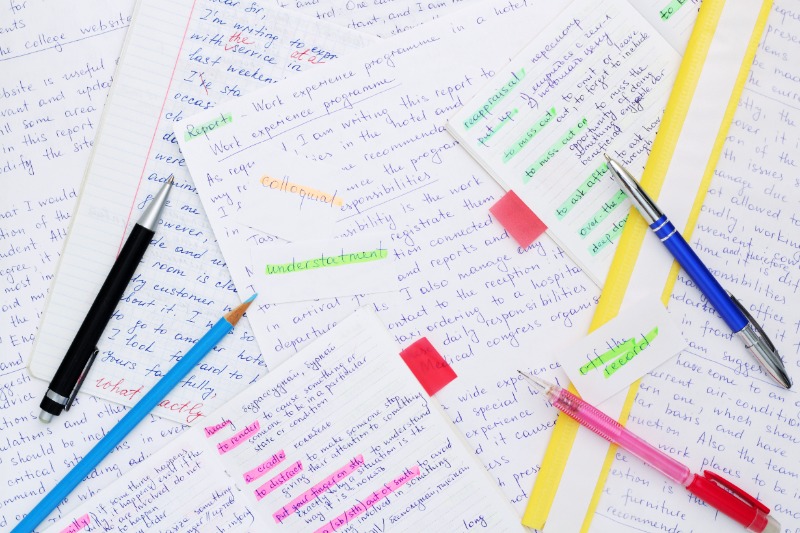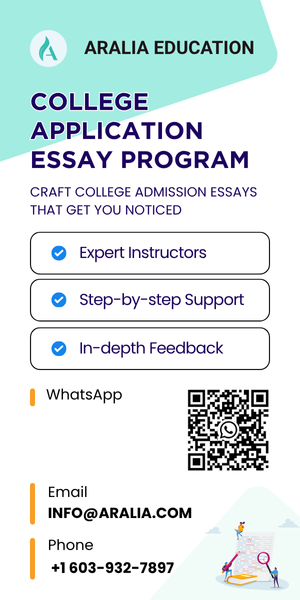The first step before you write any high school essay is to determine which type of essay you are required to write. There are 5 common types of high school essays: Descriptive, Narrative, Expository, Argumentative, and Analytical. With descriptive and narrative essays, you must use creativity to paint a story about a personal experience or communicate a deeper meaning through descriptive words and sensory details. Expository, argumentative, and analytical essays require you to investigate and explain a topic with different levels of detail and varied purposes.
Next, we provide details about strategies and tips for each type of essay to help you have a better step-by-step guide when approaching any writing assignment.
1. Descriptive Essay – The First High School Essay Type
A descriptive essay focuses on your ability to provide details and sensory descriptions for readers. So, what’s the step-by-step guide to a descriptive essay?
- Choose a specific essay topic and start brainstorming from there: With this kind of essay, you should focus on only one idea and expand on it, rather than spreading your essay thin to touch on different ideas. Once you settle on a topic, for example thunderstorms, you should write down a few related words: colors, sky, sea, cloud, rain, etc. Writing down those related words will help you have an overview and develop the essay from these descriptive words.
- Follow the structure: Start with a bold introduction, ease into the body paragraph with specific and sensory details, then end with a summary in the conclusion paragraph. A good introduction normally starts with a hook that invokes curiosity and urges the readers to learn more. After the hook, you should provide more context about what the readers can expect and what your essay will cover.
- Choose figurative and vivid language: Since the main point of a descriptive essay is in the sensory description, focus on providing vivid sensory details to enhance the description. Besides mentioning what something looks like, add what it feels, smells, sounds, or tastes like. Besides description, you can bring your emotions into the essay to connect with readers on a deeper level.
- Use transition words to lead the reader: It’s easy to fall deep into rambling about senses and descriptions. A solution to that is to use transition words to lead readers into the right stage of emotion. Having transition words will also help you understand the logical flow of the essay and have a good organization for the structure of the essay.
2. Narrative essays
Narrative high school essays ask you to tell readers about events, experiences, and incidents that happened to you or about a fictional event you imagined. The most common example of a narrative essay is the writing prompts for a personal statement when you apply to colleges. Below are the general tips for narrative essays:
- Make sure your essay has 5 elements: plot, characters, setting, conflict, and theme (can have a climax element if needed). Generally, a compelling story must have a strong plot and theme, which is the sequence of events that happened in the story and the purpose of each event. Many students make up a sequence of events to be ‘too good to be true,’ meaning that everything just lines up perfectly without any challenges or hardships for characters. A story is the reflection of real life; therefore, there must be ups and downs, as well as challenges people need to face. Conflicts are necessary to create tension, lead to resolution, and develop significant character development. In addition to plot, theme, and tension, a good story needs a setting to help readers understand the context where the event occurred. Of course, the characters involved in the event need to be mentioned and described.
- Feel free to use the first-person pronoun “I”: Since it’s your story being told from your point of view, you should use this whenever necessary to indicate and emphasize your emotions and feelings. But remember, don’t abuse this first-person pronoun, because it may distract readers from the story flow.
- Describe events in chronological order: You should write in chronological order to avoid confusing readers and help readers follow your thought process. If you’re an experienced writer, you can describe events that best fit your writing intention.
3. Expository
Expository high school essays are short pieces of academic writing that require evidence to explain or further investigate topics. Since expository essays focus on providing actual facts and evidence, having a neutral point of view is very critical. In order to write a great expository essay, you should:
- Provide a clear thesis statement in the introductory paragraph. You should put your thesis statement here because this will set the guidelines for the topics discussed within the thesis statement, and strengthen the effect and persuasion through the body paragraphs.
- Evidence support: when it comes to this type of essay, evidence support is not required to build a strong argument. Teachers give this assignment to students to test their understanding of the topic and their ability to present conveying information. Regardless of the evidence, you should still develop strong reasoning and a logical flow.
- Clarity is key: Expository writing is the opposite of narrative or descriptive writing, because writing an expository essay requires clear and concise language that readers can understand. Refrain from using figurative or sensory language that may distract readers from the essay’s main point, especially when the topic you discuss is complicated.
- Organize your essay: There is a method called the POET method. This method can organize your ideas and essay into a strong structure.
4. Argumentative
For an argumentative essay, you need to present a thesis statement, gather and evaluate evidence, and establish a position on the subject matter. There are two common models to help you form your argument: Toulmin and Rogerian models. In the Toulmin model, every argument begins with three fundamental parts: the claim, the grounds, and the warrant. In the Rogerian model, every argument aims to establish a middle ground between parties with opposing viewpoints.
- Evidential support: Different from the expository essay, an argumentative essay requires significant, well-researched, and detailed information to support the argument. However, you should be clear about what evidence you collect to prevent biased information. A well-rounded argumentative essay discusses opinions from both sides of the thesis, not only the side you prefer. You can support your thesis and stand for a side when writing a persuasive essay. However, in an argumentative essay, you should compare two positions and explain how others may not be well-informed about the topic.
- A clear and concise thesis statement in the first paragraph. As mentioned in the expository essay, argumentative essays also require you to have a strong thesis statement to inform readers about what to expect in later paragraphs. If you don’t write a comprehensive and strong thesis statement here, it’s hard to expand and develop into a strong argumentative essay.
- The conclusion should synthesize the whole essay and provide insight into further research. Many students have told us that writing the opening and closing paragraphs is the hardest part of writing. And yes, we agree with them. These two portions of the essay are what readers will remember the most. A tip that we tell students in writing a conclusion is to summarize what’s been discussed above instead of introducing new information. Furthermore, you can emphasize why the topic is important to you and briefly discuss future research in continuing your work.
5. Analytical essay
The University of Toronto has written detailed instructions about writing an analytical essay for both high school and university levels. To help you understand how to write an effective analytical essay, we would like to provide you with some valuable tips to keep in mind:
- Do research before writing the essay: Doing research utilizing primary and secondary sources will help you brainstorm the strongest arguments for your essay. A good note to remember is to discuss one point per paragraph. Don’t forget to give credit to the sources you’ve found in case the readers want to dive deeper into a point you mentioned
- Have space for opposing opinions and evidence: Due to the nature of the analytical essay, the main body should include the main points of your analysis, backed up with evidence and substance. Remember to provide contrasting opinions for a well-rounded analysis and strengthen your argument by refuting the contrasting argument with additional evidence and reasoning.
We have covered the tips and tricks to write any of the 5 types of high school essays. Besides discussing the tips, we want to mention that regardless of the essay you write, you should
- Always proofread and revise your drafts: After you have the structure and content for your essay, the next step is to read the draft over and make sure the essay is free of grammatical and punctuation errors. Review for misspellings of words, incorrect word usage, and inconsistencies in text and numbers. Additionally, you should correct sentence construction and language clarity with each revision.
- Citation: Providing credit to the authors from whom you used the source material shows your credibility in writing the paper and your respect for the previous researcher. Depending on the class instructor, there will be different citation styles that you have to follow.
These are all the tips to help you overcome any challenges in writing any essays. Writing is a skill that can’t be improved overnight, but can be improved with constant practice through the years. Even expert students are still learning to improve their writing every day. We hope that with this guide, you will approach the next writing assignment confidently. Happy writing!
Students will learn the nuances of language, including figurative language, effective structuring, and specific forms to apply to their own piece(s). Students will work directly with both literary and media texts to plan and write their piece(s). This class will also help the students write with an aim for an audience as their submission for nation-wide and international writing competitions that are timely with the course schedule.
This course helps students develop and improve their writing skills to prepare students for higher education courses. The methodology emphasizes the ability to read critically, think critically, and write critically. Students will learn informative, narrative, descriptive, creative, and persuasive essay writing skills. Students will learn how to brainstorm, structure and outline, form an argument, defend it, incorporate academic sources, and develop a clear, articulate writing style. The focus will be on the writing process, intended audience, consistent tenses, point of view, correct grammar uses, building vocabulary, appropriate style, and proper research and citation protocols.









